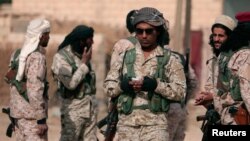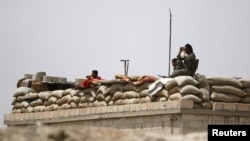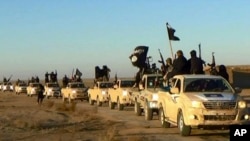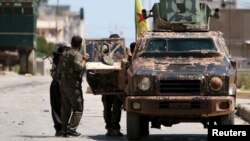Fighting between Turkish-backed rebels in northern Syria and the Kurdish-dominated Syrian Democratic Forces (SDF), earmarked by the United States to retake Raqqa from Islamic State (IS) militants, is escalating dramatically.
The intensifying clashes are complicating Washington’s bid to use Kurdish-led forces to launch a full-scale assault on the jihadists’ self-proclaimed Syrian capital, and are maneuvering the U.S. and Turkey into ever greater cross-purposes in Syria, fear Western diplomats and analysts.
Battlefield success
More than 40 villages controlled by IS have fallen to the Kurdish-led forces since the launch on November 6 of Euphrates Wrath, a Washington-conceived operation involving the SDF pressing IS in the countryside north of Raqqa ahead of an assault on the city.
Some analysts question whether the SDF has the capability to overrun Raqqa but Pentagon spokesmen insist the SDF has been effective whenever it encounters IS and that it is capable of taking the city. A former commander of Western-backed Arab rebel militias, Gen. Salim Idris, told VOA he thinks the SDF could take the city. “That is if they get enough U.S. air power,” he said.
The U.S. has been supporting the SDF with weapons and airstrikes and has deployed hundreds of special forces and military advisers to assist the Kurdish-led forces that also include Turkmen and Arab militias considered renegades by many mainstream Arab rebel militias, many of which have also received U.S. support in the past.
US strategy
U.S. war planners hope that by pressing IS in Raqqa simultaneously as Iraqi forces are attacking Mosul, the terror group’s last remaining major urban stronghold in neighboring Iraq, the jihadists’ resources and manpower will be stretched thin, weakening their ability to defend either city and hastening their fall.
But clashes between Arab Syrian rebels who have been battling to oust the regime of Syrian President Bashar al-Assad and the SDF, which is dominated by the Kurdish People’s Protection Units (YPG), the armed wing of a separatist Syrian Kurdish party, have intensified dramatically the past few days, aggravating already strained relations between Washington and Ankara and undermining the push on Raqqa as well as complicating a multi-player battlefield that’s threatening to get even messier.
Turkey opposes the use of the SDF in an assault on Raqqa, an Arab majority city. SDF forces are now poised 28 kilometers from Raqqa’s city center.
Erdogan opposes use of Kurdish fighters
Speaking at a NATO forum in Istanbul Monday, Turkish President Recep Tayyip Erdogan upped his criticism of the U.S. for its use of the YPG, which Turkey insists is inseparable from the outlawed Kurdistan Workers’ Party (PKK), with which Ankara is locked in a vicious counter-insurgency fight in south-east Turkey that has seen widespread rights abuses, according to monitors.
U.S. officials prefer to view Syria’s Democratic Union Party (PYD) and its YPG military wing as separate from the PKK.
Erdogan argued it was wrong to “treat one terrorist as good for fighting other terrorist organizations.” And using an Arab acronym for IS, he added: “We expect your support for the struggle we are giving against all terrorist organizations, first and foremost Daesh and the PKK that act jointly against humanity’s common values.”
Turkish officials say Erdogan raised his objections to U.S. backing of the Kurdish-dominated SDF in a phone conversation last week with president-elect Donald Trump. Trump has said he wants to improve relations with Ankara but he has also indicated frequently he sees the defeat of IS as the top priority when it comes to Syria and Iraq.
Turks continue to target Kurd forces
Turkish military officials confirmed Monday that their own military operations in support of anti-Assad rebels will continue to target both IS and the U.S.’s Kurdish ally. Turkey fears that Syrian Kurds are determined to carve out an independent state in northern Syria, and its Euphrates Shield operation, which began in late August, is aimed as much against preventing the emergence of a Kurdish state in Syria as combating IS.
Euphrates Shield already appears to have gone a long way to undermine the hopes of the Kurds to link all four of their cantons along that run along the Turkey-Syria border - an offensive move, the Kurds say, aimed at denying their legitimate aspirations for self-determination.
In a statement Turkish military officials said their warplanes overnight Monday hit 17 IS targets and 11 Kurdish ones, including command-and-control centers and vehicles. About another 60 IS positions were targeted by Turkish artillery, they claim.
Clashes between Syrian Arab rebels and the YPG have spread across much of northern Syria but are intensifying around three key towns - al-Bab, a town north-east of Aleppo that is still in IS hands, Manbij, which despite a YPG promise to withdraw is controlled by a Kurdish-manipulated military council, and the Kurdish enclave of Afrin, northwest of Aleppo.
Turkish-backed Free Syrian Army (FSA) and Islamic militias are mounting strong land-based attacks east and west of al-Bab, a highly strategic town they are determined to capture from IS, according to the Syrian Observatory for Human Rights, a London-based monitoring group with a network of activists on the ground in the war-wracked country.
Competition between Turkish, Kurd forces
The SDF is also keen to overrun al-Bab and has vowed to capture the town before the Turkish-based militias do. A major confrontation between the two sides over the town has been in the offing for months, and the Turkish airstrikes against the YPG have mainly focused on disrupting Kurdish forces moving from Manbij south-west to al-Bab.
“As Turkey's Operation Euphrates Shield progresses toward al-Bab, the spate of fighting between Turkish-backed rebels and the YPG is increasing,” according to analysts at Stratfor, a U.S.-based global intelligence firm. “To the United States' displeasure, the fighting has distracted the YPG and could threaten to undermine the Raqqa effort altogether,” the analysts said.
On Monday, a Pentagon spokesman told a Turkish newspaper that the U.S. does not endorse the YPG’s offensive to capture al-Bab. "We do not support nor condone any maneuvers in this area which only help Daesh who is now on the run across Iraq and Syria,” said Eric Pahon, a Pentagon spokesman.
But he also indicated disapproval of Turkey-backed targeting of the town. “Turkey's operations are being conducted unilaterally and not as part of the Coalition effort.” Last week, the Pentagon announced it was withdrawing special forces personnel detailed to the Turks’ Euphrates Shield operation - a withdrawal that highlighted the increasingly conflicting priorities between the United States and Turkey.
Fierce fighting erupted Monday between FSA brigades and the YPG in the village of Sheikh Nasser on the outskirts of al-Bab, say activists. For the FSA and Islamic militias control of al-Bab could help them smuggle in weapons and aid to districts they control in eastern Aleppo, which are besieged and under scorched-earth airstrikes by Syrian government and Russian warplanes.
As events unfold around al-Bab fears are growing that a Turkish-backed assault on the town could also spark a clash between Russia, Assad’s patron, and Turkey. There have already been reports that Assad’s Russian-supplied air defense radars have locked in on Turkish warplanes as a warning that Damascus won’t tolerate a rebel assault on the town.












